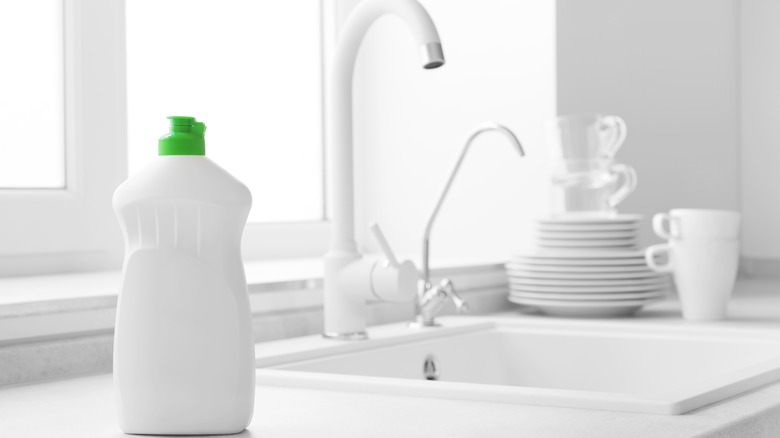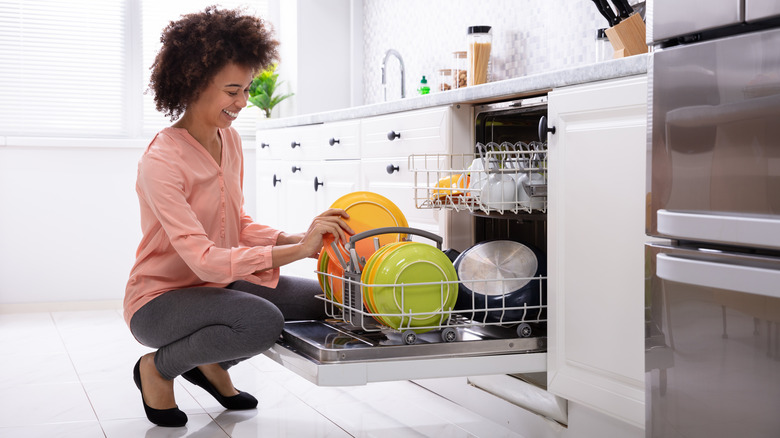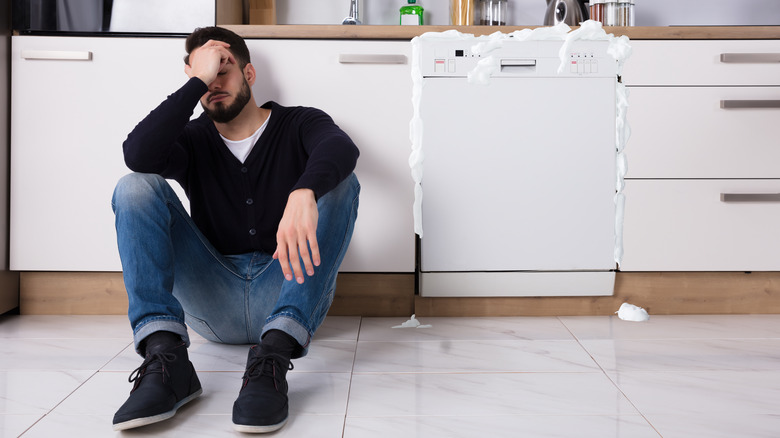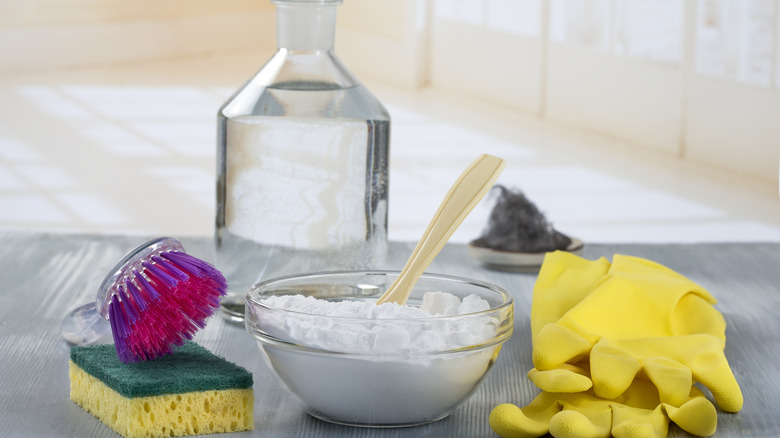What Happens If You Put Dish Soap In The Dishwasher?
Imagine the scenario: You've just finished loading your dishwasher with the day's dirty dishes, your back hurts, you're tired, and there's a Netflix show waiting for you to binge watch. All you have to do is grab a dishwasher detergent tab, pop it in, close the door, and send your dishes on their way to cleanliness. Much to your dismay, however, someone left an empty box under the sink and there isn't a single detergent tab in sight, nor did you remember to add it to the list last time you went to the supermarket. Now you have a dishwasher full of dirty dishes that you certainly don't want to pull out and clean one by one, but you also don't want to leave them overnight to gain that pungent smell characteristic of unclean dishes stifled inside a metal container for hours on end. What do you do?
At this point, you may be eyeing the container of dish soap next to your kitchen sink, wondering if just a squirt of that will do the trick. Dish soap is meant to clean dishes, right? And before the invention of the dishwasher detergent tab, didn't we also use a liquid or powder detergent in our dishwashers?
The idea is tempting. However, Home Lift Up warns anyone in this dilemma to leave the dish soap where it is if they want to avoid a complete disaster. Keep reading to find out why.
Not all dish detergents are created equal
Home Lift Up makes it abundantly clear that the soap you use to wash your dishes by hand in the sink is an altogether different beast from the detergent you purchase for your dishwasher. The most important reason why you should never substitute dish soap for dishwasher detergent is that the amount of suds dish soap generates is far greater than that of a dishwasher detergent. In fact, a dishwasher detergent hardly produces any suds at all.
While we aren't privy to the inside of a dishwasher as it works its magic, you won't want to experiment to test this theory. If you would like an idea of what happens when you put dish soap in your dishwasher, simply squirt a few drops into the basin of your kitchen sink, plug the drain, and run the water at full force directly towards the soap. The amount of bubbles this creates is only a fraction of what will happen in your dishwasher. If you don't heed this warning and decide to use dish soap in your dishwasher, not only will the result be a kitchen inundated with soap suds, but the excess bubbles produced by dish soap can also damage the pipes leading from your dishwasher to the main plumbing lines in your house, according to Ken's Plumbing.
Accidentally put dish soap in your dishwasher?
Let's say you've accidentally substituted dish soap for dishwasher detergent and started up the load. Is there a way to avoid the sudsy mess that will become your kitchen? Fortunately for you, the answer is yes. Mike Diamond Services wants to reassure you that there are a few steps you can take to correct the problem. The first step is to arm yourself with towels to tackle any potential overflow and place them around the base of the machine on your kitchen floor. Make sure you set aside a few extra to take care of any messes within the machine itself. Now turn off your machine immediately, even if it has already started its wash cycle and has begun producing suds. This will prompt it to drain any water (and at least part of the suds) that is already in action.
Once the machine has drained, pull out all the dishes and store them in the sink. Your next task will be to remove any trace of leftover dish soap. Using the towels, you'll want to wipe out any suds and water from within the machine. However, because dish soap leaves scum behind, you'll also need to rinse it out with plain water. Splash a bowl of water on the bottom, sides, and top of the machine. Alternate rinsing with wiping away suds until none remain. The last step will be to run a rinse cycle.
What to substitute for dishwasher detergent
So you've found yourself in the unfortunate situation of having loaded up your dishwasher with the day's dirty dishes and you've discovered that you're all out of dishwasher detergent. Maybe it's too late to pop to the store or you simply don't want to go to the trouble. The good news is that The Spruce offers a few alternative solutions that won't damage your machine, plumbing, or kitchen and are items you probably already have in your pantry. The website warns, however, that dishwasher detergent is your best bet for a truly clean load of dishes and any substitute cleansers should be a temporary fix.
Washing soda is one option that will get your dishes clean in a pinch. You can place the washing soda in the same compartment as your regular detergent and fill it to the top. You may also be interested in using another popular homemade cleaning product: baking soda. Use it the same way you would the washing soda. Both of these products are known for their ability to scrub dirty dishes, getting rid of all that caked-on food. Distilled white vinegar and lemon juice are another couple of substitute options that work similarly. Both are acidic, making them great at tackling grease and oil. All you'll need is 1/2 cup of either of these products situated on the top rack of the dishwasher for best performance.



